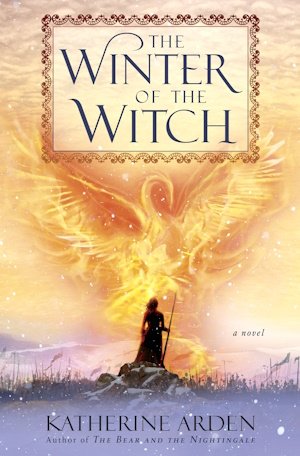Perhaps he is longing for you even now.”
Vasya had never heard anything more ridiculous. But all she said was, “How do I get into Midnight?”
“Every night, when the hour comes, my realm is there, for those with eyes to see.”
“Very well. How do I get out of Midnight again?”
“The easiest way? Go to sleep.” Midnight was watching her intently now. “And your sleeping mind will seek the dawn.”
Ded Grib popped out from under a log.
“Where were you in all this excitement?” Vasya asked him.
“Hiding,” said the mushroom-spirit succinctly. “I am glad you are not dead.” He gave Midnight a nervous glance. “Better not go looking for the winter-king, though. You’ll get killed, and after I have gone through so much trouble to be your ally.”
“I must,” said Vasya. “He sacrificed himself for me.”
She saw Midnight’s eyes narrow. She was deadly serious, but she’d not spoken in the tones of a lovelorn maiden.
“That was his choice, not yours,” said Ded Grib, looking more uneasy than ever.
Vasya, without another word, went to Pozhar, stopped a healthy distance away from where the mare was grazing. Pozhar liked to bite.
“Lady, are you all kin? You and the other horses that are birds?”
Pozhar flicked her ears in annoyance. Of course we are, she said.
Her leg already looked much better.
Vasya took a deep breath. “Then will you do me a kindness?”
Pozhar at once shied. You are not getting on my back, she said.
Vasya thought she heard Polunochnitsa laugh. “No,” Vasya said. “I would not ask it of you. I meant to ask—will you come through Midnight with me? Take me to Morozko’s white mare? Blood calls to blood, I learn.”
This last was for Polunochnitsa’s benefit. She could almost feel Polunochnitsa’s arrested stare.
Pozhar was still for a moment. Her great, golden ears flicked once, back and forth, uncertainly. I suppose I will try, said Pozhar irritably, and stamped. If that is all. But you are still not getting on my back.
“Just as well,” Vasya said. “I have a broken rib.”
Ded Grib was frowning. “Didn’t you just say—?”
“Will no one credit me with common sense?” Vasya demanded, stalking back to the fire. “Affinity guides one through the land of Midnight. Well and good, but I am not fool enough to trust the tie between Morozko and me, that was made up of lies and longing and half-truths. Especially since I suspect that the Bear might be expecting me to, and get myself killed in the process.”
Judging by Polunochnitsa’s face, that was the exact thing he was expecting. “Even if you do find him,” she said, recovering, “you won’t be able to get the winter-king out.”
“One task at a time,” said Vasya. She took a handful of strawberries from her basket, held them out. “Will you tell me something else, Lady Midnight?”

“Oh, is it bribery now?” But Polunochnitsa took the fruit, bent her head to the sweetness. “Tell you what?”
“Will the Bear or his servants follow me, if I go into Midnight after Morozko?”
Midnight hesitated. “No,” she said. “He has enough to do in Moscow. If you want to throw your life away on a prison that cannot be breached, then that is your affair.” She smelled the strawberries again. “But I will give you a last warning. The midnights nearest you only cross distance. You can go into and out of them as you will. But the farther midnights—those cross years. If you fall asleep there, and lose the Midnight-road, then you will vanish like the dew, or your flesh fall at once to dust.”
Vasya shuddered. “How will I know which is near and which is far?”
“It doesn’t matter. If you wish to find the winter-king, you must not sleep until you do.”
She took a deep breath. “Then I will not fall asleep.”
VASYA WENT TO THE LAKE to take a long drink, and found the bagiennik writhing, furious, in the shallows. “The firebird has come back!”
snarled the bagiennik. “Against all hope, to live again by the water.
And perhaps there will be a great herd again, to fly over the lake at dawn. Now you are taking her away on your own foolish errand.”
“I am not forcing her to come with me,” said Vasya gently.
The bagiennik beat his tail against the water, wordlessly miserable.
Vasya said, “When Pozhar wishes to come back, she may. And—if I survive this, then I will come and live by the lake and learn, seek out all the scattered horses and tend them. In memory of my own, whom I loved very much. Will that content you?”
The bagiennik said nothing.


























